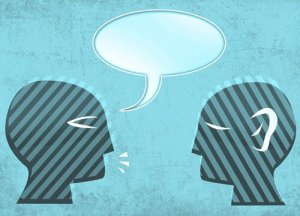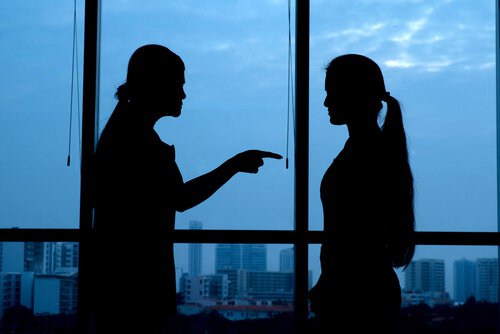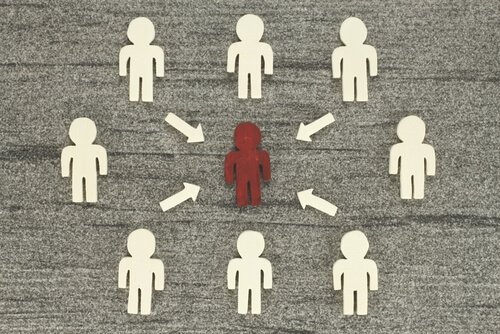Don't Blame Others for Your Feelings

Our everyday language shows that we are constantly trying to place the blame for our feelings and actions on others. “You make me so angry!” is one of the most common phrases or “That person fills me with bad energy.” Both phrases are very common and both hold great fallacies.
“There are people that create their own storms and then get upset when it rains.”
How is it that others are responsible for your rage? Are you their puppet, slave or tool? How is it possible that you completely lose control of your emotional world when faced with other people?
One of the traits that defines an adult is precisely the ability to assume responsibility for their own emotions and actions.

Everyone else is simply a pretext
No matter how limiting the circumstances may be, you always have a margin of freedom to act upon. Even if someone puts a gun to your head and they intimidate you to do something, you still have the option to choose to surrender or not.
Without taking things to that extreme, in our everyday life we frequently must choose between multiple possibilities. And, of course, in a relationship with other people, we also have the choice to act in different ways.
“You need two to tango,” as the popular saying says. And it’s completely true. When faced with an aggression, you have the choice to get sucked in, ignore it or understand it.
The same happens with sadness, fear and the whole spectrum of emotions: it’s not up to anyone else but you.
It’s a lie that if others do or don’t do something, we will be able to find our balance. It’s false that if others change, we will also change.
What happens is that sometimes we don’t want to assume the responsibility for our feelings. Others become a pretext to justify our lack of self-control or our inability to assume what we are.
That’s why we create these mistaken explanations about what’s happening to us: If she wasn’t so passive, I would prosper more. If he was more affectionate, I wouldn’t feel so sad. These types of complaints, translate into: “the control and management of what I feel is in other people’s hands.”
But we’re not an island either…
Other people’s influence over our emotions is merely a factor. They facilitate or inhibit certain feelings, moods or attitudes. But in some cases they determine them.
It would be most obvious to say that if you feel irritated by the presence of someone in particular, or sadder when you have a conversation with them, you should keep away from that person. However, this is not so simple.
Human beings are full of contradictions. So though you feel more prone to getting angry in the presence of someone, that same person might provide a special dynamic to your life, or they offer you challenges you might find attractive.
We’re also don’t live within a world divided into good and bad or healthy and sick people. We’re all a bit of everything. We also go through moments in which we enjoy being tormented by someone, or become insufferable due to all of our complaining about our sadness.
There is no ideal world in which your behavior is as unflappable as the Dalai Lama, or where you’re going to be surrounded only by people who maintain a foolproof balance.

What you can do is work on eliminating that belief that your feelings depend on other people. That it’s not your responsibility to work on your negative emotions, but it’s others who should do it instead.
If you manage to get rid of that logic, you’ll realize that everything will become simpler. And that sooner rather than later, situations will evolve. You’ll get to know yourself better and possibly discover that until now you’ve been tormented by situations that aren’t worth the trouble.
So, you’ll be better prepared to prioritize your conflicts. You’ll be able to give value to the problems that truly deserve it, and leave behind those pretexts that kept you from moving forward.
Our everyday language shows that we are constantly trying to place the blame for our feelings and actions on others. “You make me so angry!” is one of the most common phrases or “That person fills me with bad energy.” Both phrases are very common and both hold great fallacies.
“There are people that create their own storms and then get upset when it rains.”
How is it that others are responsible for your rage? Are you their puppet, slave or tool? How is it possible that you completely lose control of your emotional world when faced with other people?
One of the traits that defines an adult is precisely the ability to assume responsibility for their own emotions and actions.

Everyone else is simply a pretext
No matter how limiting the circumstances may be, you always have a margin of freedom to act upon. Even if someone puts a gun to your head and they intimidate you to do something, you still have the option to choose to surrender or not.
Without taking things to that extreme, in our everyday life we frequently must choose between multiple possibilities. And, of course, in a relationship with other people, we also have the choice to act in different ways.
“You need two to tango,” as the popular saying says. And it’s completely true. When faced with an aggression, you have the choice to get sucked in, ignore it or understand it.
The same happens with sadness, fear and the whole spectrum of emotions: it’s not up to anyone else but you.
It’s a lie that if others do or don’t do something, we will be able to find our balance. It’s false that if others change, we will also change.
What happens is that sometimes we don’t want to assume the responsibility for our feelings. Others become a pretext to justify our lack of self-control or our inability to assume what we are.
That’s why we create these mistaken explanations about what’s happening to us: If she wasn’t so passive, I would prosper more. If he was more affectionate, I wouldn’t feel so sad. These types of complaints, translate into: “the control and management of what I feel is in other people’s hands.”
But we’re not an island either…
Other people’s influence over our emotions is merely a factor. They facilitate or inhibit certain feelings, moods or attitudes. But in some cases they determine them.
It would be most obvious to say that if you feel irritated by the presence of someone in particular, or sadder when you have a conversation with them, you should keep away from that person. However, this is not so simple.
Human beings are full of contradictions. So though you feel more prone to getting angry in the presence of someone, that same person might provide a special dynamic to your life, or they offer you challenges you might find attractive.
We’re also don’t live within a world divided into good and bad or healthy and sick people. We’re all a bit of everything. We also go through moments in which we enjoy being tormented by someone, or become insufferable due to all of our complaining about our sadness.
There is no ideal world in which your behavior is as unflappable as the Dalai Lama, or where you’re going to be surrounded only by people who maintain a foolproof balance.

What you can do is work on eliminating that belief that your feelings depend on other people. That it’s not your responsibility to work on your negative emotions, but it’s others who should do it instead.
If you manage to get rid of that logic, you’ll realize that everything will become simpler. And that sooner rather than later, situations will evolve. You’ll get to know yourself better and possibly discover that until now you’ve been tormented by situations that aren’t worth the trouble.
So, you’ll be better prepared to prioritize your conflicts. You’ll be able to give value to the problems that truly deserve it, and leave behind those pretexts that kept you from moving forward.
This text is provided for informational purposes only and does not replace consultation with a professional. If in doubt, consult your specialist.







